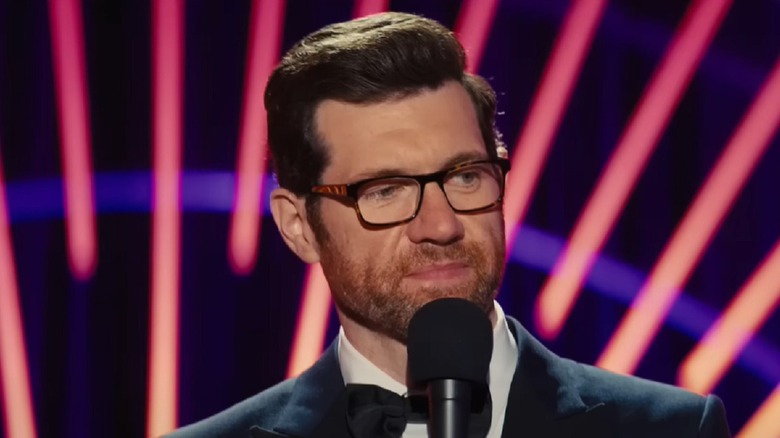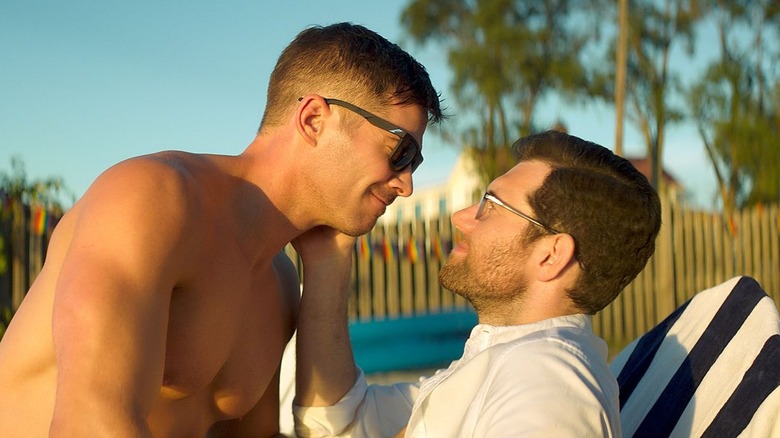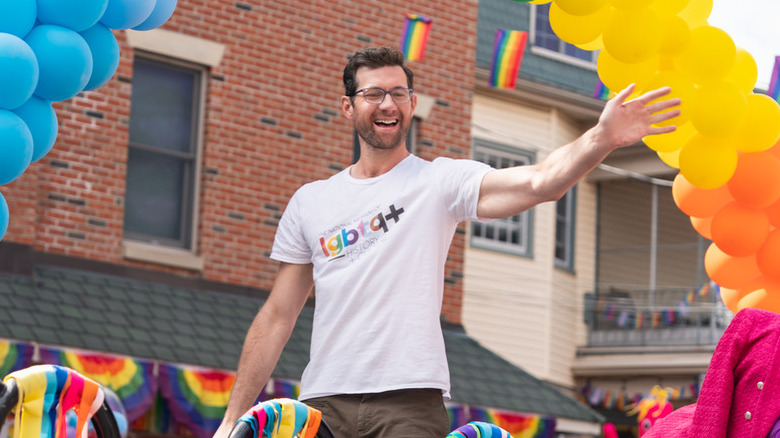Bros Review: Love Isn't Love
- One of the most fun and diverse casts of the year
- Unpacks a lot of thorny ideas about modern masculinity within queer communities
- Occasionally gets bogged down by making its "representation matters" themes too literal
- Longer than it truly ought to be
Healthy depictions of homosexual romance on screen are commonplace in the annals of queer cinema, independent films, and stories told on the margins of the media. But Nicholas Stoller's "Bros," co-written by and starring Billy Eichner, seeks to bring that same level of representation to the mainstream romantic comedy, to set a story about two men who fall in love on the same shelf as Nora Ephron's "You've Got Mail," and countless Judd Apatow produced flicks.
The former is directly referenced in the movie, as Bobby Lieber, Eichner's podcaster turned museum curator, compares the AOL-era romcom to him messaging with an absent-minded prospective Grindr hook-up. But it's the latter's pantheon of modern comedies that "Bros" feels most adept at aping and subverting, sharing a kinship in terms of joke-to-feels ratio, absurdism percentages, and being led by a scruffy, somewhat stunted romantic lead.
Apatow's Rogens and the like tended to play Sandler-esque man-children grasping at maturity like straws through weed haze, but in Bobby, we have a protagonist shackled with years of barely repressed anger at a world that didn't him to be himself, such that it imprisons him in a repetitive cycle of empty hook-ups and self-deception. That is until he meets Aaron (Luke Macfarlane), a hunky lawyer who is Bobby's opposite in every conceivable way.
"Bros" takes that jumping-off point and weaves a charming love story as good as any beloved "straight" romcom, unpacking complex themes about modern masculinity within the queer community in surprising and effective ways. It only falters when it seems too prepossessed with poking fun at rainbow capitalism or breaking the fourth wall about "Bros'" historic standing as a feature film.
Masculinity can be a prison, baby!
Bobby Lieber is a famous podcaster and failed children's novelist who has accepted a new gig helping to open America's first LGBTQ+ history museum, but despite living what he constantly suggests is the ideal life, he's missing one thing: true love. That's really where all good romcoms start, right? Introduce a protagonist, paint a gaping black hole squarely on their chest then watch them struggle to fill it with somebody pretty. Then, when all seems won and love comes out on top, a reason for them to be apart must be contrived, so the two can separately decide to come back together stronger than ever. It's a well-worn formula for a reason. So, of course "Bros" is no different.
Aaron is a lawyer who deals with writing and updating wills, exclusively interacting every day with people who are about to die. He also looks like a WWE Superstar and sounds like Patrick Warburton, so he's the perfect love interest for a movie like "Bros." Bobby and Aaron have the obvious opposites attract energy, but they come from such opposing POVs. For Bobby, being gay is an integral part of his identity, and he's been privileged to live in a big city with a bustling sense of community amongst his friends. But Aaron, from a smaller town background, refuses to do relationships or be particularly vulnerable with any of his sex partners.
The idea of commitment is absurd to both of them for different reasons. Aaron doesn't love himself enough to fully embrace who he is, and Bobby is too devoted to his own self expression to leave room for much else. Bobby's insecurities convince him Aaron doesn't want to truly date because he's not a roided out Greek god like the other guys Aaron sees, but Aaron, as much as he jokes about how dumb other gay guys are, thinks Bobby is too smart and too interesting for someone as boring and repressed as he sees himself.
They're both shackled by the rigors of masculinity from opposite ends. "Bros" is at its most fascinating and enriching when it's showcasing their perspectives and wrestling with all the ways gay men struggle through body image issues, societal expectations and their own generational baggage. Eichner and Stoller do exemplary work weaving all these themes into an actually compelling love story. It helps that Eichner and Mcfarlane have stellar chemistry and that the movie allows us to see each character through the other's eyes for a deeper connection with the audience.
But it's also great that they don't shy away from any of the physical aspects of their coupling. This isn't a movie that just has chaste kissing and hand-holding, even if it still pulls its punches on occasion for what must be MPAA-related reasons. It's a warts and all look at two men coming together and falling in love, even if for much of the runtime, this love story takes a back seat to luxuriating in the fact that this movie exists at all.
Death to gay-for-pay
In the film's introduction to Bobby's storied background as a semi-popular cis, white gay man, he gives a telling aside about being hired to write a gay rom-com. Peering right through the camera at the audience watching this, he outlines what must have been a real conversation with a movie producer at some point about how what he wanted to do with a gay love story was too angry, too thorny, and too off-putting to the straights.
There's a playful antagonism on display, as the inclusivity here feels designed to be as abrasive as possible, despite the fact that the vast majority of people coming to see this movie are choosing to, not having something foisted upon them mandatorily. At first, it manifests in a litany of great gags. Bobby watches a fake Hallmark channel movie touted as being the first bisexual Christmas movie, a funny bit outdone later in the film when it reappears as the first poly Christmas movie, featuring seven individuals holding hands in the snow. There are also many references to Hollywood's history of casting straight performers in gay roles for awards season clout. But all the nose-thumbing at heteronormativity proves a lot less interesting than the way the film explores inter-community relations.
The team assembled to launch the queer history museum is a diverse little coalition featuring among others Jim Rash as a bisexual man, TS Madison as a transwoman, and Dot-Marie Jones as a lesbian, with each team member representing their slice of the alphabet with vigor. Their scenes together prove effective examples of the queer community not being monolithic while having fun and making jokes about the casual intersectional Olympics at play within their individual quests for representation. Having a predominantly queer cast helps "Bros" cultivate an authenticity that could have otherwise damned the film to the same fate as something like "Love, Simon" with its treacly, mom-safe banality.
But these interludes seem at odds with some of the more surface-level humor Eichner imbues Bobby with, where he emphatically stands by a jaded, near stereotypical refutation of the "love is love" ideology. He repeatedly insists that being forty, single, and having hollow sex with near strangers is enough and that not every gay person wants to get married. But the film centers Bobby around a group of friends, all of who are partnered, thriving, and experiencing a wide array of intimacies with one another, highlighting that Bobby himself is something of a relic.
There's a scene when he's brought to spend time with his nephew the parents suspect may be gay. Bobby is reminded that for this new generation, coming out isn't so cagey a proposition and that half his nephew's classmates are non-binary. "It's easy for them," Bobby points out. "We had AIDS and they had Glee." Bobby, as a character, and Eichner, as a storyteller, seem racked with a kind of survivor's guilt about existing in this shiny, new, allegedly queer-friendly status quo when so many others died before ever seeing a world where someone could so passively brag about their child having non-binary classmates.
By the film's end, it's clear the chip "Bros" carries on its shoulder is an understandable one. "Gay rom-com" is about as bare minimum as Hollywood ought to allow, but for decades, queer performers had to hide who they were to get roles, and their stories were told by people only seeking to exploit their trauma for easy melodrama. It's an absolute triumph that "Bros" exists, and it still works best when it's just being an unapologetically queer love story and not screaming from a megaphone about it the whole time.
But you can't entirely begrudge folks who've been pressured by the world around them to whisper for finally getting to shout from the rooftops.


